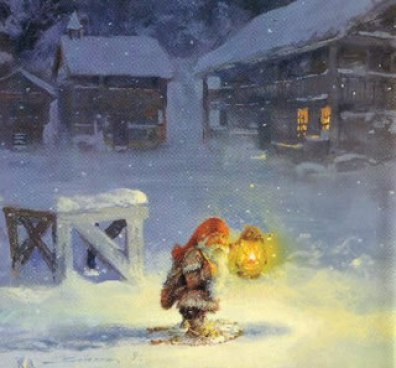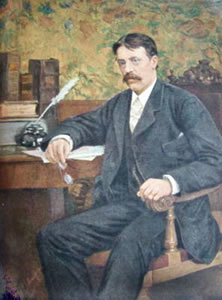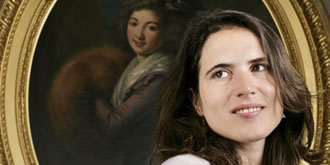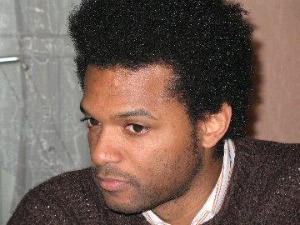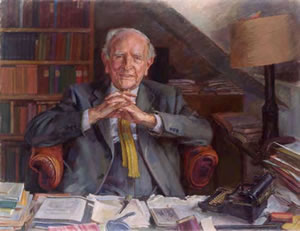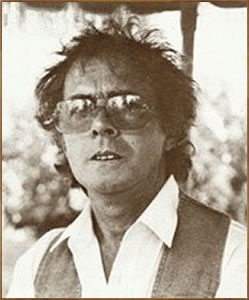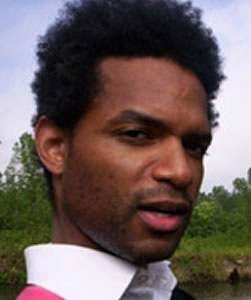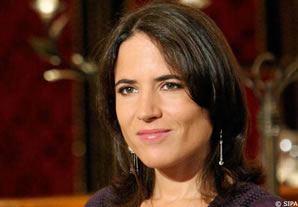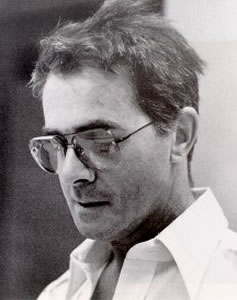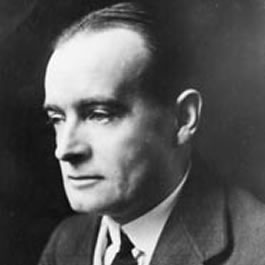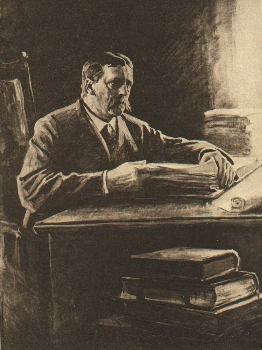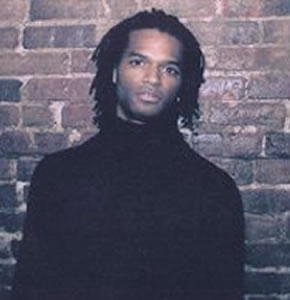De Amerikaanse schrijfster Amy Michael Homes werd geboren op 18 december 1961 in Washington DC. Zie ook alle tags voor A. M. Homes op dit blog.
Uit: Days of Awe
“Brother on Sunday
She is on the phone. He can see her reflection in the bathroom mirror, the headset wrapped around her ear as if she were an air-traffic controller or a Secret Service agent. “Are you sure?” she whispers. “I can’t believe it. I don’t want to believe it. If it’s true, it’s horrible. . . . Of course I don’t know anything! If I knew something, I’d tell you. . . . No, he doesn’t know anything either. If he knew, he’d tell me. We vowed we wouldn’t keep secrets.” She pauses, listening for a moment. “Yes, of course, not a word.”
“Tom,” she calls. “Tom, are you ready?”
“In a minute,” he says.
He examines himself in her makeup mirror. He raises his eyebrows, bares his teeth, smiles. And then he smiles again, harder, showing gum. He tilts his head, left and right, checking where the shadows fall. He turns on the light and flips the mirror to the magnifying side. A thin silver needle enters the reflection; there’s a close-up of skin, the glistening tip of the needle, surrounded by a halo of light. He blinks. The needle goes into the skin; his hand is steady on the syringe. He injects a little here, a little there; it’s just a touch-up, a filler-up. Later, when someone says, “You look great,” he’ll smile and his face will bend gently, but no lines will appear. “Doctor’s orders,” he’ll say. He recaps the syringe, tucks it into his shirt pocket, flips the toilet seat up, and pees.
When he comes out of the bathroom, his wife, Sandy, is there, in the bedroom, waiting. “Who was that on the phone?” he asks.
“Sara,” she says.
He waits, knowing that silence will prompt her to say more.
“Susie called Sara to say that she’s worried Scott is having an affair.”
He says, quite honestly, “Of all people, Scott isn’t someone I’d think would be having an affair.”
“She doesn’t know that he’s having an affair-she just suspects.” Sandy puts her cover-up into a tote bag and hands him his camera. “Can’t leave without this,” she says.
“Thanks,” he says. “Are you ready to go?”
“Check my back,” she says. “I felt something.” She turns, lifting her blouse.
“You have a tick,” he says, plucking it off her.
Somewhere in the summer house, a loud buzzer goes off. “The towels are done,” she says. “Should we take wine?” he asks.
“I packed a bottle of champagne and some orange juice. It is Sunday, after all.”

A. M. Homes (Washington DC, 18 december 1961)
De Franse schrijfster Mazarine Pingeot werd geboren in Avignon op 18 december 1974. Zie ook alle tags voor Mazarine Pingeot op dit blog.
Uit: Ils m’ont dit qui j’étais
“La comtesse de Ségur et les Jalna
Je dois à la comtesse de Ségur mes premières émotions de lectrice. J’avais quatre ans et je ne savais pas lire. Chaque soir, mon père s’asseyait au bord de mon lit et me lisait deux chapitres d’un de ces romans, que je pouvais dès le lendemain caresser dans la bibliothèque, comme des êtres amis qui détenaient mes mystères.
Le livre a l’apparence d’une boîte hermétique, mais je savais déjà qu’il suffisait de l’ouvrir pour que surgissent mes pensées les plus secrètes, lovées entre les phrases de cette vieille comtesse. Mon père seul avait la clef, même s’il ne connaissait pas le butin de rêves que j’accumulais à l’ombre de ses inflexions de voix.
Son pouvoir absolu sur mon univers intime occasionna de nombreuses disputes : « Et pourquoi pas un troisième chapitre ? » Impossible de m’endormir sans savoir ce que deviendra Paul dans Les Vacances de Paul, dont j’étais parfaitement amoureuse, impossible d’ignorer la tristesse de Sophie – même si je préférais Camille et Madeleine. L’apprentissage de la frustration ne me détourna pas de la lecture, au contraire. Je compris avant l’heure le principe des feuilletons dont je deviendrai fan un peu plus tard, qu’il s’agisse de Dallas ou de Santa Barbara, ce qui ne rivalise en rien – cela pour rassurer les parents inquiets – avec les livres. J’aurais peut-être dû apprendre à lire par moi-même pour échapper à mon aliénation. Mais sans doute me plaisait-elle, alors.
Je ne relirai pas la comtesse de Ségur. Je préfère laisser ainsi vivre dans mes souvenirs ces personnages qui perdraient de leur grandeur, confrontés à l’analyse de la femme de vingt-huit ans que je suis. Ce qui importe, c’est la vague mémoire des moments de bonheur perdus qu’agite en moi la simple évocation des ouvrages de la comtesse de Ségur.”

Mazarine Pingeot (Avignon, 18 december 1974)
De Amerikaanse schrijver Miles Marshall Lewis werd geboren op 18 december 1970 in The Bronx, New York. Zie ook alle tags voor Miles Marshall Lewis op dit blog.
Uit:The Sound In Our Veins
“In ’87 Miles Davis had been working with Prince—my hero—behind closed doors, and so my ears had been cocked all night long for anything smacking of Madhouse (Prince’s own one-man-band jazz project). Davis’s most recent record Tutu—named for South African activist Desmond Tutu—gets plenty of spins at home. The first album I’d ever spent my own money on at 13 was the Miles Davis live album, My Funny Valentine. I was, naturally, named after him and so his significance to me was cemented. Being a teenager embarrassed by my dad’s (actually pretty cool) outburst might be my major memory of the show. I’d see him again at 20, the year he died.
How would someone young get turned on to jazz, an art form with its most innovative days behind it?
My parents played all kinds of diverse music on our living room’s hi-fi stereo system in the 1970s when I was in my single digits, jazz included. Electric-period Miles Davis was in full swing at the time, and so plenty of Bitches Brew, On the Corner, Get Up with It (I loooved its bluesy “Honky Tonk”) and Big Fun shocked our Bronx apartment. Herbie Hancock’s Head Hunters looms large in my memory, funky tracks like “Watermelon Man” and “Chameleon.” Plenty of Quincy Jones. Moms loved Pharoah Sanders’ Karma and “The Creator Has a Master Plan.”
Growing up later as a NYC teenager in a golden age of Hip-Hop, arguably also a golden age of pop, jazz had plenty of competition. My first jazz show wasn’t Miles. A smooth-jazz loving uncle snuck me into a show at the famed Bottom Line jazz club when I was far too young to be there, a 16-year-old watching 16-year-old organist Joey DeFrancesco do his thing. Genuine interest on my part led the family to expose me to stuff like this; none of it felt forced on me. College love connections around the corner seemed more sophisticated with mood music like Thelonious Monk Plays Duke Ellington in the background.
Denzel Washington starred in director Spike Lee’s Mo’ Better Blues in 1990, centered on a conflicted, egocentric jazz trumpeter. Few modern African-American romances exist in Hollywood; me and a whole young black generation were transfixed. A “Mo’ Better Suggested Listening” chapter of Spike’s making-of book featured recommendations by Branford Marsalis, Jeff “Tain” Watts and Terry Blanchard, and I sought out a few. One of my first winter season dance performance shows at Alvin Ailey turned me on to Alice Coltrane’s “Something About John Coltrane,” and Journey in Satchidananda. Seeing tap dancer Savion Glover star in the Broadway musical Black and Blue introduced me to Duke Ellington’s “In a Sentimental Mood.” I soaked up jazz that moved me wherever I could find it.”

Miles Marshall Lewis (New York, 18 december 1970)
Hier met zijn zoontjes
De Zweedse dichter en schrijver Viktor Rydberg werd geboren op 18 december 1828 in Jönköping, Zweden. Zie ook alle tags voor Viktor Rydberg op dit blog.
Tomten (Fragment)
Går till stängslet för lamm och får,
ser, hur de sova där inne;
går till hönsen, där tuppen står
stolt på sin högsta pinne;
Karo i hundbots halm mår gott,
vaknar och viftar svansen smått,
Karo sin tomte känner,
de äro gode vänner.
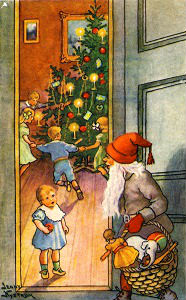
Illustratie bij Tomten door Jenny Nyström
The tomte glances at sheep and lambs
Cuddled in quiet rest.
The chickens are next, where the rooster roosts
High above straw filled nests.
Burrowed in straw, hearty and hale,
Karo wakens and wags his tail
As if to say, “Old friend, “Partners we are to the end.”

Viktor Rydberg (18 december 1828 – 21 september 1895)
Monument voor Viktor Rydberg in Göteborg
De Russische dichter en schrijver Jakov Petrovitsj Polonski werd geboren in Rjazan op 18 december 1819. Zie ook alle tags voor Jakov Polonski op dit blog.
Winter Path
The night was cold looks dull
Under a Mat of my tent,
Under field runners squeaks,
Under the arc of the bell resounds,
And the coachman whipping horses.
Beyond the mountains, the forests, the smoke clouds
Shines gloomy Ghost of the moon.
Howl long hungry wolves
Heard in the fog dense forests.-
I haunted by strange dreams.
I all fancy: if the bench is,
On the bench sat the old woman,
Until midnight yarn spinning,
I loved tales of my says,
Lullaby sings.
And I see in my dreams, as the wolf riding
I’m going down the path of the forest
To fight with the sorcerer-king
In the country where the Princess sits under lock and key,
Smothered behind a solid wall.
There’s the glass Palace is surrounded by gardens
There the fire birds sing at night
And peck Golden fruit,
There babbling key living and the dead key water –
And don’t believe and trust in the eyes.
A cold night just looks dull
Under a Mat of my tent,
Under field runners squeaks,
Under the arc of the bell resounds,
And the coachman whipping horses.

Jakov Polonski (18 december 1819 – 30 oktober 1898)
De Birmees – Britse schrijver Saki (pseudoniem van Hector Hugh Munro, een naam gekozen uit de Rubaiyat van Omar Khayyam) werd geboren op 18 december 1870 in Akyab, Birma. Zie ook alle tags voor Saki op dit blog.
Uit: The toys of peace
“That is Louis the Fourteenth,” Eric was saying, “that one in knee-breeches, that Uncle said invented Sunday schools. It isn’t a bit like him, but it’ll have to do.” “We’ll give him a purple coat from my paintbox by and by,” said Bertie. “Yes, an’ red heels. That is Madame de Maintenon, that one he called Mrs. Hemans. She begs Louis not to go on this expedition, but he turns a deaf ear. He takes Marshal Saxe with him, and we must pretend that they have thousands of men with them. The watchword is Qui vive? and the answer is L’etat c’est moi — that was one of his favourite remarks, you know. They land at Manchester in the dead of the night, and a Jacobite conspirator gives them the keys of the fortress.” Peeping in through the doorway Harvey observed that the municipal dust-bin had been pierced with holes to accommodate the muzzles of imaginary cannon, and now represented the principal fortified position in Manchester; John Stuart Mill had been dipped in red ink, and apparently stood for Marshal Saxe. “Louis orders his troops to surround the Young Women’s Christian Association and seize the lot of them. ‘Once back at the Louvre and the girls are mine,’ he exclaims. We must use Mrs. Hemans again for one of the girls; she says ‘Never,’ and stabs Marshal Saxe to the heart.” “He bleeds dreadfully,” exclaimed Bertie, splashing red ink liberally over the facade of the Association building. “The soldiers rush in and avenge his death with the utmost savagery. A hundred girls are killed” — here Bertie emptied the remainder of the red ink over the devoted building— “and the surviving five hundred are dragged off to the French ships. ‘I have lost a Marshal,’ says Louis, tut I do not go back empty-handed.— Harvey stole away from the room, and sought out his sister. “Eleanor,” he said, “the experiment—” “Yes?” “Has failed. We have begun too late.”

Saki (18 december 1870 – 14 november 1916)
Cover Spaans luisterboek
De Britse toneelschrijver Christopher Fry, pseudoniem van Christopher Harris, werd geboren in Bristol op 18 december 1907. Zie ook alle tags voor Christopher Fry op dit blog.
Uit: The Dark is Light Enough
“GELD A. Yours may not, but mine may. I meant
To love you. Moreover, I meant I should be loved.
Solemnly to God I said so.
GETTNE R. ! b ite so.
But when promises are merely hopes, and hopes
Aren’t realized, where are the promises kept ?
GELDA. In me, it would seem.
GETTNE R. I see. And I see as well
Strange possibilities.
GELDA. You needn’t think
I Shalltake less care for your safety than I would
If I were still your wife.
GETTNER. You can now tell me
Why you talk to me like this ? With no
Confidence at all , I’m bound to ask you
Am I loved in any way ? I know I’m not,
But, for my own good, I Should like
This conversation well defined.
GELDA. Richard,
There ’s no definition. I was turning back
To some old thoughts . Some sort of love there was,
But whether it left me or whether I turned from it
It became remote. Sometimes
You can watch a single bird flying over
Towards the vague mountains , until you no longer know
Whether you see or imagine where it is.
I have a feeling of no definition.
A dead husband and a dead wife
Perpetuated in a sacrament.
GELDA. The dead may have a thought, but no more deeds.
GETTNER. Now which of us has the fear ?
You may have withdrawn the words , but they implied
A kindness which you can’ t help leaving with me,
Which has to be confirmed. My curiosity
IS great ; I begin to wonder who you are.
[He kisses
How dead are the husband and the wife ? No words , now.
And yet I also wonder how it must feel
To be so close to a living body
Which in a question of hours may well
Be dead, gone, and promising to be rotten?”

Christopher Fry (18 december 1907 – 30 juni 2005)
Scene uit een opvoering in Gateshead, 1956
De Duitse schrijver Thomas Strittmatter werd geboren op 18 december 1961 in St. Georgen in het Zwarte Woud. Zie ook alle tags voor Thomas Strittmatter op dit blog.
Uit: Der Polenweiher
„HUNGERBÜHLER […] Und warum, frag ich dich, warum schwätzt du dann die ganz Zeit, als ob sie noch lebendig wär? Die ganz Zeit. Und warum guckst du mich immer so an? Glaubst, du könntest sie wieder lebendig schwätzen? Nimmt den Hammer.Tote soll man tot sein lassen.
Die beiden arbeiten stumm weiter
HUNGERBÜHLERIN Weißt du, was der Kommissär neulich zu mir gesagt hat?
HUNGERBÜHLER War ich dabei?
HUNGERBÜHLERIN lächelt Nein, das warst du net.
HUNGERBÜHLER Und was hat er gesagt, dein Herr Kommissär?
HUNGERBÜHLERIN Daß ich schöne Händ hab.
HUNGERBÜHLER lacht kurz auf. Räuspert sich, spuckt.
HUNGERBÜHLERIN Wart, vielleicht bring ich es noch zusammen: Wisse, noch liegt Blutschuld auf der Stadt. Von deiner Hand.
HUNGERBÜHLER bleibt im Schlag wie erstarrt stehen. Läßt seinen Hammer langsam sinken.“
(…)
„KOMMISSAR […] Meine Ermittlungen sind abgeschlossen. Ich danke für Speis und Trank. Ganz besonders verabschiede ich mich von Ihnen, Hungerbühler. Hochachtung, ich weiß, was für einen Mann ich vor mir habe.
HUNGERBÜHLER Danke, Herr Kommissar.
KOMMISSAR Sind Sie eigentlich UK gestellt?
HUNGERBÜHLER Jawohl, Herr Kommissar.
KOMMISSAR Schön für Sie, Hungerbühler, sehr schön. Denn bald wird es richtig hart auf hart gehen. Sie wissen, was man munkelt. Die Yan-kies, die Ami! Kein Spaziergang mehr, wie in Polen. Aber unver-drossen weiter. Des Lebens Fackel wollten wir entzünden/Ein Feu-ermeer umschlingt uns, welch ein Feuer.“

Thomas Strittmatter (18 december 1961 – 29 augustus 1995)
Poster voor een opvoering in Frankfurt am Main, 2005
Zie voor nog meer schrijvers van de 18e december ook mijn blog van 18 december 2016 deel 2.





